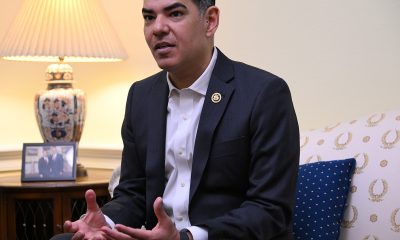Politics
Senate hearing set for gay judicial nominee
Oetken could become first openly gay male to sit on federal bench
A Senate hearing has been scheduled on Wednesday for a judicial nominee who, if confirmed, could become the first openly gay male to sit on the federal bench.
The Senate Judiciary Committee is set to considered the nomination of J. Paul Oetken, whom President Obama nominated in January to become a U.S. district judge for the Southern District of New York. The hearing is scheduled for 2:30 p.m. in Room 226 of the Dirksen Senate Office Building.
Sen. Chuck Schumer, who recommended the nomination of Oetken to the bench in September, is set to preside over the hearing. Obama officially nominated Oekten to the position based on Schumer’s recommendation.
According to Schumer’s office, Oetken has practiced law at Debevoise and Plimpton, and since 2004, has served as associate general counsel at Cablevision. From 1999 to 2001, Oetken was associate counsel to President Clinton and specialized in First Amendment issues, presidential appointments, ethics, civil rights, and legal policy.
Oetken also served in various roles as an LGBT advocate. The nominee has been involved with Lambda Legal and the American Civil Liberties Union. Additionally, Oetken co-authored a U.S. Supreme Court friend-of-the-court brief in Lawrence v. Texas, which struck down sodomy laws throughout the country.
Along with Oetken, the committee is slated to consider during the hearing three other nominations: Bernice Bouie Donald, who’s been nominated to become U.S. circuit judge for the Sixth Circuit; Paul Engelmayer, who’s also been nominated to become a U.S. district judge for the Southern District of New York; and Ramona Villagomez Manglona, who’s been nominated to become a judge for the district court for the Northern Mariana Islands.
Obama in January also nominated another openly gay man to the federal bench, Edward DuMont. The president tapped him to serve as an appellate judge and to sit on the U.S. Court of Appeals for the Federal Circuit.
Whether the Senate first grants Oetken or DuMont confirmation will determine who becomes the first openly gay male to serve on the federal bench. Should DuMont receive confirmation, he would also become the openly LGBT federal appellate judge.
The Senate is considering the nomination of Oetken after the White House rejected the nomination of Daniel Alter, another New York attorney and former director of civil rights for the Anti-Defamation League, for the same position.
In October, the Washington Blade reported that the White House rejected the Alter nomination, which was recommended by Schumer, based on comments he reportedly made challenging inclusion of the phrase “under God” in the Pledge of Allegiance and suggesting that merchants not wish shoppers “Merry Christmas” during the holidays. Alter has denied he made the reported comments.
While Oetken could be the first openly gay male to serve on the federal bench, he wouldn’t be the first openly LGBT person. In 1994, President Clinton nominated Deborah Batts, an out lesbian, to serve as federal judge also for the U.S. District Court of the Southern District of New York.
The San Francisco Chronicle reported last year Judge Vaughn Walker of the U.S. District Court for Northern District of California is gay, although Walker wouldn’t comment on the reporting. Walker presided over Perry v. Schwarzenegger, a federal case that will determine the constitutionality of Proposition 8 in California.
Congress
EXCLUSIVE: Garcia demands answers on deportation of gay Venezuelan asylum seeker
Congressman’s correspondence was shared exclusively with the Blade

U.S. Rep. Robert Garcia (D-Calif.) is demanding answers from the Trump-Vance administration on its deportation of Andry Hernández Romero, a gay Venezuelan makeup artist who was sent to a prison in El Salvador in violation of a federal court order and in the absence of credible evidence supporting the government’s claims about his affiliation with a criminal gang.
Copies of letters the congressman issued on Thursday to Immigration and Customs Enforcement and CoreCivic, a private prison contractor, were shared exclusively with the Washington Blade.
Garcia noted that Hernández, who sought asylum from persecution in Venezuela over his sexual orientation and political beliefs, had entered the U.S. legally, passed a preliminary screening, and had no criminal record.
Pro-bono lawyers representing Hernández during his detention in the U.S. pending an outcome in his asylum case were informed that their client had been removed to El Salvador a week after he failed to show for a hearing on March 13.
Hernández’s family now fears for his safety while he remains in El Salvador’s Terrorism Confinement Center (CECOT), which has a well documented record of human rights abuses, Garcia said.
Additionally, the congressman wrote, while experts say Tren de Aragua does not use tattoos as identifiers, the “primary evidence” supporting Hernández’s deportation based on his supposed links to the transnational Venezuelan gang “appears to have been two crown tattoos labeled ‘Mom’ and ‘Dad,’ which are common cultural symbols in his hometown.”
The determination about his links to or membership in the organization was made by a CoreCivic employee whose criminal record and misconduct as a law enforcement officer led to his termination from the Milwaukee Police Department, Garcia wrote in his letter to the company.
Requesting a response by May 1, the congressman asked CoreCivic President Damon T. Hininger to address the following questions:
- What qualifications and training does CoreCivic require for employees tasked with making determinations about detainees’ affiliations?
- What protocols are in place to ensure that determinations of gang affiliation are based on credible and corroborated evidence?
- How does CoreCivic oversee and review the decisions made by its employees in such critical matters?
- What mechanisms exist to prevent and address potential misconduct?
- What is the nature of CoreCivic’s collaboration with ICE in making determinations that affect deportation decisions? Are there joint review processes?
- What background checks and ongoing assessments are conducted for employees involved in detainee evaluations, particularly those with prior law enforcement experience?
- What guidelines does CoreCivic follow regarding the use of tattoos as indicators of gang affiliation, and how does the company ensure that cultural or personal tattoos are not misinterpreted?
In his letter to Tae D. Johnson, acting director of ICE, Garcia requested answers to the following questions by May 1:
- Did ICE personnel independently review and approve the determination made by CoreCivic employee Charles Cross Jr. identifying Mr. Hernández Romero as a member of the Tren de Aragua gang?
- What evidence, beyond Mr. Hernández Romero’s tattoos, was used to substantiate the claim of gang affiliation?
- Under what legal authority are private contractors like CoreCivic permitted to make determinations that directly impact deportation decisions?
- What vetting processes and background checks are in place for contractors involved in such determinations? Are there oversight mechanisms to ensure their credibility and adherence to due process?
- What guidelines does ICE follow regarding the use of tattoos as indicators of gang affiliation, and how does the company ensure that cultural or personal tattoos are not misinterpreted?
Together with U.S. Rep. Maxwell Frost (D-Fla.), Garcia wrote to U.S. Rep. James Comer (R-Ky.) on Tuesday requesting permission to bring a congressional delegation to CECOT for purposes of conducting a welfare check on detainees, expressing specific concern for Hernández’s wellbeing. The congressmen said they would “gladly include any Republican Members of the committee who wish to participate.”
Hernández’s case has drawn fierce criticism of the Trump-Vance administration along with calls for his return to the U.S.
Influential podcaster and Trump ally Joe Rogan spoke out in late March, calling the deportation “horrific” and “a horrible mistake.”
Last week, California Gov. Gavin Newsom (D) sent a letter to Kristi Noem, secretary of the U.S. Homeland Security, which manages ICE, demanding Hernández’s immediate return and raising concerns with the right to due process amid the administration’s crackdown on illegal immigration.
Hernández “was denied the opportunity to defend himself against unsubstantiated allegations of gang involvement or to present his asylum claim,” the governor wrote. “We are not a nation that sends people to be tortured and victimized in a foreign prison for public relations victories.”
Immigrant Defenders Law Center President Lindsay Toczylowski, who is representing Hernández, has not been able to reach her client since his removal from the U.S., she told NBC News San Diego in a report published April 11.
“Under the Constitution, every single person has a right to due process, and that means they have a right to notification of any allegations the government is making against them and a right to go into court and prove that those allegations are wrong if that’s the case,” she said. “In Andry’s case, the government never gave us that opportunity. In fact, they didn’t even bring him to court, and they have forcefully sent him to El Salvador without ever giving us any notice or without telling us the way that we could appeal their decision.”
“CECOT, this prison where no one has ever left, where people are held incommunicado, is a very dangerous place for someone like Andry,” Toczylowski said.
In March, a DHS spokesperson posted on X that Hernández’s “own social media indicates he is a member of Tren de Aragua,” though they did not point to any specific posts and NBC reported that reviews of his known social media accounts turned up no evidence of gang activity.
During a visit to CECOT in March, Time Magazine photographer Philip Holsinger photographed Romero and reported that the detainee plead his innocence — “I’m not a gang member. I’m gay. I’m a stylist.” — crying for his mother as he was slapped and his head was shaved.
Congress
House Republicans advance two anti-trans education bills
Congresswoman Jahana Hayes, LGBTQ groups slammed the effort

Republicans members of the House Education and Workforce Committee advanced two anti-transgender bills on Wednesday, one that would forcibly out students in public elementary and middle schools to their parents and a second covering grades K-12 that critics have dubbed a “don’t say trans” bill.
More specifically, under the PROTECT Kids Act, changes to “a minor’s gender markers, pronouns, or preferred name on any school form or sex-based accommodations, including locker rooms or bathrooms” could not be made without parental consent, while the Say No to Indoctrination Act would prohibit schools from teaching or advancing “gender ideology” as defined by President Donald Trump’s anti-trans Jan. 20 executive order, Defending Women from Gender Ideology Extremism and Restoring Biological Truth to the Federal Government.
U.S. Rep. Jahana Hayes (D-Conn.), who was named national teacher of the year before her election to Congress, rose to speak out against the bills during the committee’s convening on Wednesday.
“Curriculum does not include teaching students to be something else. Curriculum does not include indoctrinating students to identify as gay or LGBTQ or other or anything. But federal law mandates that all students have civil rights protections,” she said.
The congresswoman continued, “I don’t really understand what the members of this committee think happens in schools, but my question is, what do we do with these children? The children who you are saying, on this committee, don’t exist, the children who are struggling with their identity and often times confide in their teachers and ask for support and help.”
“What we’re doing in this committee is focusing on a small population of students who are at a point in their life where they are struggling and school may, for many of them, feel like the only safe place or the only place where they can get support, or the only place where they can speak to a counselor,” Hayes said.
“And as a teacher, I don’t care if it was just one student that I had to reassure that they were important and they were valued and they belonged here,” she said. “I’m going to do it, and anyone who has dedicated their life to this profession will do the same. So the idea that you all feel okay with arbitrarily erasing, disappearing people, making them think that they they don’t exist, or they don’t have a place in schools, or the curriculum should not include them, or whatever they’re feeling should not be valued, considered, Incorporated, is just wrong.”
“So I will not be supporting this piece of legislation, as if that was not already evident, and I will be using all of my time, my agency, my energy, my advocacy, to ensure that every student,” Hayes said, “feels valued, respected, important and included in the work that I engage in on this committee.”
The congresswoman concluded, “when you are in a classroom and you are a teacher, and that door closes and a student falls in your arms and says to you, I am struggling, and I can’t go home with this information, and I need Help, you have a moral responsibility to help that child or you are in the wrong profession. I yield back.”
The Congressional Equality Caucus slammed the bills in an emailed statement from the chair, U.S. Rep. Mark Takano (D-Calif.), who noted that the legislation comes as “Donald Trump is illegally trying to dismantle the Department of Education and pass tax cuts for billionaires.”
“Extreme Republicans in Congress are trying to distract Americans by advancing cruel, anti-trans legislation,” said the congressman, who is gay. “School districts, teachers, and staff best understand how to draft age-appropriate, inclusive curriculums and craft policies that both respect the important role parents play in children’s education and the importance of students’ safety.”
“Yet, Republicans’ Don’t Say Trans Act would cut critical funding for schools if their teachers teach lessons or include materials that simply acknowledge the reality of trans peoples’ existence,” Takano added. “Republicans’ forced outing bill would put kids in danger by requiring schools that want to take certain steps to affirm a transgender student’s identity to forcibly out them to their parents — even if the school knows this will put the student’s safety at risk.”
The caucus also slammed the bills in a series of posts on X.
🚨BAD BILLS ALERT🚨
— Congressional Equality Caucus (@EqualityCaucus) April 9, 2025
Today, the GOP-controlled Education Committee is voting on two anti-trans bills: One to force teachers to out trans students if they want to take certain steps to affirm the students’ identities, and a “Don’t Say Trans” bill.
Here's why we’re opposed: 🧵
The Human Rights Campaign also issued a statement on Wednesday by the organization’s communications director, Laurel Powell:
“Instead of putting our dangerous President in check and tackling the American economy’s free fall, House Republicans showed where their priorities lie — giving airtime to junk science and trying to pass more anti-LGBTQ+ legislation.
“Forcing teachers to ‘out’ trans youth rather than supporting them in coming out to their families and demanding that schools ignore the trans students who sit in their classrooms is a craven attempt to distract people from economic disaster by vilifying children.
“Even as they fire people whose jobs were to make sure schools have the resources they need, the Trump administration and their allies in Congress continue to attack vulnerable young people to score points with the far right.”
Politics
Trump’s battle with Maine over trans policies escalates
State has filed a lawsuit, federal government has cut funding and launched investigations

A months-long standoff between between President Donald Trump and Maine Gov. Janet Mills (D) continued to escalate this week with a lawsuit targeting the administration on Monday and cuts to federal grants to the state on Tuesday.
The conflict kicked off on Feb. 21 at the White House, where the president threatened Mills with retaliation after she declined to say that her state would not comply with his executive order barring transgender athletes from competing in school sports. The governor and other officials have said the policy is in conflict with provisions of the Maine Human Rights Act, while the president argued his executive action supersedes state law.
While the heated exchange between the two concluded with each party vowing to see the other in court, developments in the time since suggest that Trump and Mills are likely to square off over legal questions far broader than whether the White House can prohibit trans girls in a blue state from joining the field hockey team.
In a complaint filed on Monday, Maine Attorney General Aaron Frey argued U.S. Department of Agriculture Secretary Brooke Rollins had unlawfully frozen funding for “certain administrative and technological functions” in schools in his state after concluding, in the absence of a formal investigation, that some of their programs violated Title IX rules. A letter last week from Rollins notifying Mills of the USDA’s decision warned that it was “only the beginning.”
Then on Tuesday, the Maine Department of Corrections said the Justice Department had cancelled several grants, which according to the Maine Morning Star would have supported “drug treatment for adults in reentry, programs that foster engagement between incarcerated parents and their children, and resources for corrections agencies to improve post-release supervision in order to prevent recidivism and reduce crime.” U.S. Attorney General Pam Bondi said during an interview that the move came in response to the state’s incarceration of a transwoman in a women’s prison.
One of Trump’s day-one executive actions targeting trans rights included a provision directing the AG and the Homeland Security secretary to ensure that women’s prisons and detention centers do not detain or house “males” or trans women, though here and elsewhere the administration deliberately does not make the distinction — and in Section 2 of the order, establishes that the policy of the federal government will be to treat gender as a binary that is fixed at birth, a narrow definition that denies the biological reality that people can be intersex (meaning their sex characteristics cannot be clearly distinguished as male or female) while others, like trans individuals, may experience incongruity between their gender and birth sex.
Leading up to this week, other major developments following the Feb. 21 White House confrontation between Trump and Maine’s Democratic governor include:
- A probe in late March by the U.S. Department of Education into whether policies in Maine schools that protect the privacy of students by prohibiting disclosures to parents about the sexual orientation or gender identity of their kids may violate federal law,
- Trump’s demand for an apology from Mills on her refusal to do so, both in late March,
- DOE’s determination in late March that schools in the state were violating Title IX by allowing trans women and girls to compete in sports, which came after the Trump administration reversed that portion of the Title IX guidance issued under former President Joe Biden,
- An announcement in mid-March by the the U.S. Department of Health and Human Services Office for Civil Rights that the Maine Principals’ Association and Greely High School violated Title IX by allowing trans athletes to compete in sports,
- The USDA’s decision in early March to hold up funding for universities in the University of Maine system pending the conclusion of the agency’s probe into possible violations of Title IX and Title VI, which was subsequently reinstated after a couple of weeks,
- The National Oceanic and Atmospheric Administration’s withdrawal of funding in early March for the University of Maine’s Maine Sea Grant program, which was followed less than a week later with the U.S. Department of Commerce ‘s announcement that it would be renegotiated, and
- HHS’s determination in late February that the Maine Department of Education violated Title IX, a conclusion reached just four days after an investigation was opened and without any interviews, data requests or negotiations.
-

 District of Columbia4 days ago
District of Columbia4 days agoFinal push to raise funds, fill D.C. hotels as WorldPride nears
-

 District of Columbia3 days ago
District of Columbia3 days agoReenactment of 1965 gay rights protest at White House set for April 17
-

 Maryland4 days ago
Maryland4 days agoFreeState Justice: Transgender activist ‘hijacked’ Moore’s Transgender Day of Visibility event
-

 Hungary3 days ago
Hungary3 days agoHungarian MPs amend constitution to ban public LGBTQ events











